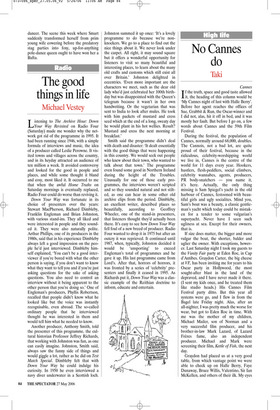The good things in life
Michael Vestey
Listening to The Archive Hour: Down Your Way Revisited on Radio Four (Saturday) made me wonder why the network got rid of the programme in 1995. It had been running since 1946, with a simple formula of interviews and music, the idea of a producer called Leslie Perowne. It visited towns and villages across the country, and in its heyday attracted an audience of ten million a week. It avoided controversy and looked for the good in people and places, and while some thought it bland and cosy, most liked it. It occurred to me that when the awful Home Truths on Saturday mornings is eventually replaced, Radio Four could do worse than reviving it.
Down Your Way was fortunate in its choice of presenters over the years: Stewart MacPherson, Richard Dimbleby, Franklin Engleman and Brian Johnston, with various stand-ins. They all liked and were interested in people and they sounded it. They were also naturally polite. Arthur Phillips, one of its producers in the 1980s, said that in his experience Dimbleby always left a good impression on the people he’d just interviewed. Dimbleby himself explained, ‘You can’t be a good interviewer if you’re bored with what the other person is saying, if you don’t want to know what they want to tell you and if you’re just asking questions for the sake of asking questions. You also need to control an interview without it being apparent to the other person that you’re doing so.’ One of Engleman’s producers, Phyllis Robertson, recalled that people didn’t know what he looked like but the voice was instantly recognisable, even abroad. The so-called ordinary people that he interviewed thought he was interested in them and would tell him what he needed to know.
Another producer, Anthony Smith, told the presenter of this programme, the cultural historian Professor Jeffrey Richards, that working with Johnston was fun, as one can easily imagine. Johnston, Smith said, always saw the funny side of things and would giggle a lot, rather as he did on Test Match Special. Dimbleby felt that with Down Your Way he could indulge his curiosity. In 1950 he even interviewed a navy diver underwater in a Scottish loch. Johnston summed it up once: ‘It’s a lovely programme to do because we’re nonknockers. We go to a place to find out the nice things about it. We never look under the carpet. All right, it may sound square but it offers a wonderful opportunity for listeners to visit so many beautiful and interesting places, to learn about the many old crafts and customs which still exist all over Britain.’ Johnston delighted in eccentrics. ‘Even more important are the characters we meet, such as the dear old lady who’d just celebrated her 100th birthday but was disappointed with the Queen’s telegram because it wasn’t in her own handwriting. Or the vegetarian that was sent to India to look after mules. He took with him packets of mustard and cress seed which at the end of a long, sweaty day he would plant in his hot wellies. Result? Mustard and cress the next morning at breakfast.’ Smith said the programme didn’t deal with death and disaster: ‘It dealt essentially with the good things that were happening in this country. We would seek out people who knew about their town, who wanted to talk about that town.’ The programme even found some good in Northern Ireland during the height of the Troubles. Unusually for one of those early programmes, the interviews weren’t scripted and so they sounded natural and not stilted, as one can hear in some other old archive clips from the period. Dimbleby, an excellent writer, described places so beautifully, according to Geoffrey Wheeler, one of the stand-in presenters, that listeners thought they’d actually been there. It’s easy to see how Down Your Way fell foul of a new breed of producer. Radio Four wanted to drop it in 1975 but after an outcry it was reprieved. It continued until 1987, when, typically, Johnston decided it would be ‘unsporting’ to exceed Engleman’s total of programmes and he gave it up. His last programme came from Lord’s. After that, horrors of horrors, it was fronted by a series of ‘celebrity’ presenters and finally it ceased in 1995. As Richards put it, Down Your Way was a classic example of the Reithian doctrine to inform, educate and entertain.










































































































 Previous page
Previous page